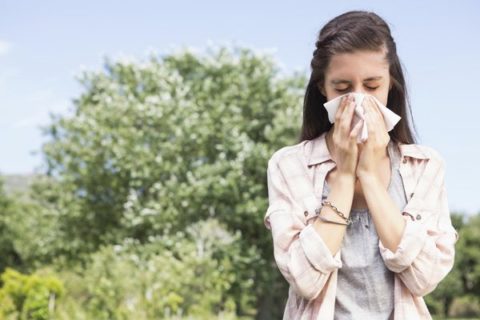Your hairspray is causing your itchy eyes: 9 tips for dealing with allergies

Did you know that your hairspray could be making your allergies worse? Neither did we, until a recent chat with Dr. Cliff Bassett, medical director of Allergy and Asthma Care of NY. Finally, the pieces are starting to come together, after months of stuffy-nosed sleepless nights. “The big thing for [women] is hair products,” he says. “Mousse or gel or paste, [they’re] a pollen magnets. What happens at night? You put your hair on [your] pillow and when you wake up, you’re not feeling so good.”
Most seasonal allergies start in March and run through the summer, cycling from tree pollen to grass pollen to weed and mould allergies. While sometimes you might think you have a cold (which is also possible), if the sneezing, runny nose, itchy and red eyes persist, it could be a good idea to test for allergies. “Allergies are 100% treatable,” says Dr. Bassett. “And they can lead to asthma, sinusitis and other things that impair quality of life, [like] poor sleep. People feel tired during the day not because they have allergies, but because they’re not sleeping [at] night.”
If you’re just a little sneezy when you get to work, you can complement your allergy care routine with aromatherapy oils to soothe your nose and clear your nasal passages (if you’re sensitive to fragrance, skip this step!). Saje Allergy Release Soothing Mist is an office favourite for quick pick-me-ups and there are also rollerball options to slip into your purse.
Tips from Dr. Bassett:
1. Wear a wide-brimmed hat and oversized glasses during the day to keep airborne pollens and moulds from getting in your eyes.
2. Change your clothes before entering your bedroom and throw them in the wash to prevent pollen from getting on your sheets.
3. Wash your hair before going to sleep so pollen doesn’t accumulate on your pillow.
4. On high pollen days (check here to see your city’s pollen levels), exercise indoors.
5. If you’re going to treat yourself to a bouquet, go for orchids, tulips, irises or roses instead of lilies, sunflowers, lilacs or other super-fragrant flowers.
6. Keep your car and home windows closed, and don’t line-dry your clothes.
7. Keep eyelid wipes and nasal saline in your purse, so you can swipe off/rinse out pollen throughout the day.
8. See your doctor and/or allergist for solutions. There are many prescription and over-the-counter drugs that work. You can even do immunotherapy (allergy shots and drops) for a long-term fix.








